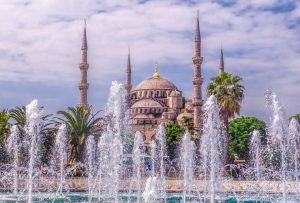Hakan Yavuz in Boston Review:
 Turkey is entering a new era. Following a failed military coup against President Recep Tayyip Erdoğan in 2016, a referendum last April approved sweeping constitutional amendments amidst a government-declared state of emergency and allegations of electoral misconduct. The changes call for a super-executive presidency without robust checks and balances. And as a result of June’s presidential elections, not only is the government being reorganized under Erdoğan’s authoritarian leadership, but Turkish society is being recreated in his vision of the Ottoman past.
Turkey is entering a new era. Following a failed military coup against President Recep Tayyip Erdoğan in 2016, a referendum last April approved sweeping constitutional amendments amidst a government-declared state of emergency and allegations of electoral misconduct. The changes call for a super-executive presidency without robust checks and balances. And as a result of June’s presidential elections, not only is the government being reorganized under Erdoğan’s authoritarian leadership, but Turkish society is being recreated in his vision of the Ottoman past.
In speech after speech, Erdoğan has called Turkey’s identity essentially Ottoman (Osmanlılık). The premise has policy implications both at home and abroad. It is supposed to follow that Turkey has a right, if not a duty, to defend the rights of Muslims in former Ottoman territories. It was Erdoğan who supported the independence of Albanian Muslims in the Republic of Kosovo, telling a cheering crowd in the capital of Priština that “Turkey is Kosovo and Kosovo is Turkey.” His language is similar when it comes to the Palestinians: they, too, are claimed as Ottoman Muslims. If there is a master key to this code of the New Turkey, it is a reimagined Ottoman-Islamic identity—one pioneered by Turgut Özal in the 1980s as prime minister and then president, and now reconstituted for the twenty-first-century by Erdoğan and his fellow Justice and Development Party (AKP) member Ahmet Davutoğlu.
The Ottoman Empire dissolved in 1922. It was superseded by the Republic of Turkey, whose first president, Mustafa Kemal, embarked on a sweeping program of secular, westernizing reforms—a period known as the Atatürk era. The Ottoman Caliphate was abolished, Islamic canon law was replaced with a secular civil code, and women were granted full political rights.
What does Ottomanism signify nearly a century later?
More here.
